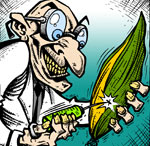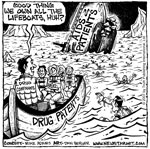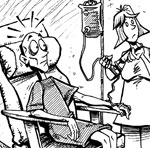Isn't There Just a Shot for Shingles? A Shingles Vaccine?
| Share on Facebook | Share on Twitter | Share on Google+ |
It took nearly 200 years for medical science to come up with a shingles vaccine. At first, researchers tried giving injections of the antibodies that fight the varicella-zoster virus. This isn't really a vaccination, because a vaccination stimulates the immune system to make antibodies. This would be the actual antibodies, the same kind of treatment that is given for hepatitis A (instead of a vaccine) and rabies (along with a vaccine). There was one major problem with injecting people with varicella-zoster virus antibodies once they got shingles. The treatment just didn't work.
In 1995, the United States FDA approved a vaccine for chickenpox. In 2006, it approved a vaccine for shingles to be given to people 60 and older, and in 2011 it expanded the age range for getting the vaccine to people 50 and older. The shingles vaccine seems to prevent a lot of cases of shingles, but there are still people who get shingles despite taking the vaccine. Three large clinical studies have found the vaccine "100% effective at preventing severe shingles," but in the one year study period in the clinical trials about 30% of the expected number of people still came down with "milder" cases shingles.
Or at least that what doctors will read. If you go into the fine print of the Shingles Prevention Study, you would find out that the Zostravax vaccine:
- Reduced the incidence of post-herpetic neuralgia, the long-term stabbing pain that can linger after the skin has healed, by 66%.
- Reduced the incidence of all cases of shingles by 51%.
- Caused serious side effects such as the very symptoms of shingles the shot is given to prevent-in about 1 in 70 people given the vaccine (compared to 1 in 50,000 for the chickenpox vaccine). The shingles vaccine side effect is shingles!
No one really knows how long the vaccine works, but it is not known to be more effective for more than 4 years. It won't do anything for you if you don't take it before shingles break out. And since 1.5% of people who took the vaccine actually developed shingles, and only about 1.5% of people in the same age group who get the vaccine develop shingles anyway, the real bottom line is that you are more likely to get shingles if you take the vaccine, but at least you will get it right away rather than at some unpredictable time in the future.
What Can You Do About Shingles Once They Break Out?
There are literally hundreds of pharmaceutical remedies for the symptoms of shingles. There are relatively few natural remedies for shingles, but they tend to work quite well.
Proteolytic enzymes. The proteolytic enzymes bromelain (from pineapple) and papain (from papaya) are natural meat tenderizers. These enzymes were compared to the standard antiviral drug acyclovir in a double-blind study involving 192 people. The volunteers for the study were given either the natural enzymes or the medication and then evaluated on the seventh and fourteenth days of the study. Both groups had similar levels pain relief, although reddening of the skin was reduced more by acyclovir. Similar results were found in another study involving 90 people.
The tricky issue in using proteolytic enzymes to treat shingles is that they can be broken down by stomach acid. For this reason, most brands are enteric-coated. This means they are covered with cellulose so that the tablet does not dissolve until it reaches the intestine.
If your enzymes are not in an enteric-coated capsule that protects them against stomach acid, they will not work. Make sure the brand you use is coated. Chymotrypsin is usually a pork product, so vegetarians and other persons who do not eat pork may prefer bromelain or papain. Holding the pill in the mouth can break down the enteric tissues and dissolve soft tissues, so always take proteolytic enzymes with water. Eating pineapple and papaya won't help because the enzymes in them are destroyed in the stomach.
Digestive enzymes are safe for use by almost everyone. However, enteric-coated pancreatic enzymes given to people who have cystic fibrosis have been known to cause a serious complication known as fibrosing colonopathy, probably due to an interaction between the enzymes and the coating of the tablet. Frequent use of proteolytic enzyme supplements can cause especially foul-smelling fatty floating stools as well as especially pungent flatulence. These products sometimes induce allergic reactions that cause wheezing, sneezing, or tearing from the eyes.
If you are allergic to pineapple, don't use bromelain. If you are allergic to pork, don't use chymotrypsin. And if you are allergic to papayas or you are allergic to latex, don't use papain. Sometimes the allergens from the foods from which the enzymes are extracted find their way into the product.
Herbal remedies. There are certain herbs that are anti-inflammatory, and there are other herbs that are antiviral. Some of the best products combine anti-inflammatory herbs and with anti-viral herbs. These products tend to be more expensive than most single-herb products, but they are a lot less expensive than buying each herb separately.
- Echinacea purpurea, also known as purple coneflower, or sometimes American coneflower, is primarily an anti-inflammatory herb. It is probably better for stimulating the immune system to fight bacterial infections that it is for fighting viral infections, but by the time you have shingles break out, it's too late to fight the virus. What you can do is to prevent secondary infections by bacteria, especially by the strep bacteria that cause a really nasty skin infection called cellulitis.
- Lemon balm is an herb that fights the varicella-zoster virus directly. Sometimes you find this herb labeled under its botanical name Melissa officinalis. The best time to start taking lemon balm is as soon as you feel tingling, queasiness, or fever, before the blisters break out. Lemon balm speeds up healing the blister stage, in just two days in the case of 77-year-old Pat mentioned earlier in this article.
- Skullcap, sometimes referred to by its botanical name Scutellaria or just as "scute," is a traditional nerve tonic. There have not been any clinical trials of skullcap as a treatment for shingles, but what readers tell me is that it helps with the pain that lingers after the skin clears up. It is better to start taking skullcap sooner rather than later.

I have seen people get good results just from taking lemon balm. I never suggest that anyone take herbs instead of prescription medication, but I have worked with some people for whom the cost of medication was a severe issue. Lemon balm works. A combination of echinacea, lemon balm, and skullcap works better.
There are two products by Native Remedies that combine these three herbs. They aren't specifically for shingles; in fact, they are marketed for children's skin issues (and very few children get shingles). However, Chikkie Spot Drops and Chikkie Spot Soother should be as helpful for older adults as they are for younger children. I would recommend them over treatment with any single herbal remedy. They will not interfere with any medical treatments, and they do not have any known side effects except for women who are trying to get pregnant and who are not very likely to have shingles. Echinacea can interfere with ovulation and reduce the chances of getting pregnant after unprotected sex.
-
Skin CareMen Skin Care
-
Free ResourcesFree eBooks
-
A good laugh and a long sleep are the best cures in the doctor's book.Irish Proverb
-
What We RecommendIf you do an analysis of the ingredients in a bottle of
 Total Balance and compare with other products you will find that it provides exceptional value for money…even against simple mass produced products with lower bottle costs.
Total Balance and compare with other products you will find that it provides exceptional value for money…even against simple mass produced products with lower bottle costs.
-



















